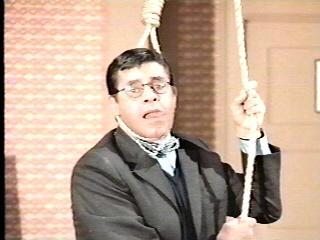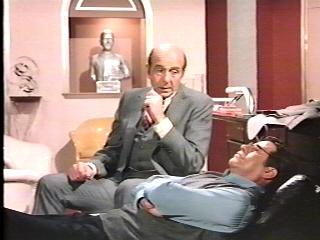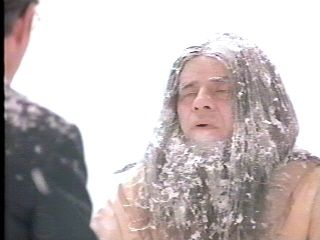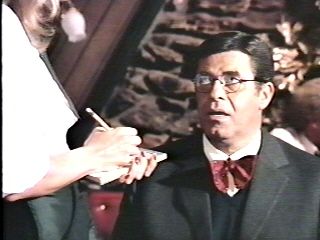|
Cracking Up
(1982)
Director: Jerry Lewis
Cast: Jerry Lewis, Herb Edelman, Milton Berle, Sammy Davis Jr.
Not to be confused with the 1977
comedy of the same name, Cracking Up might be
considered by many to be the last "pure" Jerry Lewis movie. That is,
the last Jerry Lewis movie where he not only was the  central star, but was also central star, but was also
the director and screenwriter. Though he actually did co-write this
particular screenplay with another writer, there's no mistaking the
finished movie for anything else but a pure Jerry Lewis movie, one that
can be placed beside such movies made 20 or more years earlier.
Unfortunately, one of the common traits this particular Lewis movie
shares with those older ones is that it isn't very good at all. Upon
watching it, it's easy to understand why its American distributor upon
seeing it got cold feet and gave it almost no release, even though the
Jerry Lewis movie released the previous year (Hardly Working)
managed to generate a respectable amount at the box office despite
being far worse than this effort.
It's so easy to bash Lewis, dismissing him as an strident goofball who
can do nothing but make weird faces. While that is one side of his
comic act, it's unfair and inaccurate to label all of his comedy as
such. Plus, I don't want anyone to think that my panning of Cracking
Up comes from having this wrong viewpoint of Lewis. Though
there have certainly been some Lewis movies I have despised (Which
Way To The Front, The Family Jewels), there have
been some that have managed to tickle me throughout, like Don't
Give Up The Ship and The Ladies' Man. (In fact
the latter's "hat" sequence I personally think is one of the funniest
sequences in Hollywood history.) In the better Lewis movies such as
these, you not only get to see him successfully perform a wide range of
comic styles, but you also see his talents as a director when he got
behind the chair. However, his gain of creative control was a
double-edged sword. Though at first it helped to showcase his talent,
as the years went by it ultimately gave him his bad reputation. Looking
at his output after The Nutty Professor, it becomes
clear that Lewis didn't realize that he was becoming too old to play
goofballs, that he was tiring audiences by repeating the same basic
characters and gags over and over, and audiences' comic tastes were
evolving to embrace different (and edgier) styles.
You might then think that during his lengthy absence
from the screen after completing Which Way To The Front
in 1970, Lewis might have reflected on his descent and observed the new
direction comedy was taken, and use what he learned to not only polish
his standard schtick into something that seemed  more fresh, but maybe
even be inspired enough by the new generation of comedians so that he'd
come up with new and modern comic material that better reflected the
era he now found himself in. Though upon seeing Cracking Up (or
Hardly Working, for that matter), it quickly
becomes clear that Lewis either was purposely ignoring the new styles
of comedy, or was simply ignorant of its evolution that had started
even before his hiatus. If you place this movie next to his efforts
15-20 years earlier, in almost every aspect it's as if no time had
passed at all between the making of this movie and those others; we
have the same kind of gags, the same kind of oddball characters, all in
the exact style Lewis established decades earlier. It's as if Lewis
hadn't learned anything new about comedy in all those years. Though at
the same time it's as if Lewis had forgotten a lot of what he
learned, because from a technical viewpoint (directing, editing, etc.),
the results are executed with staggering incompetence. Lewis was still
ill at the time, which might explain a lot of this, but it makes no
sense to work under such dire conditions if your output is going to be
so substandard - especially if others are to be exposed to it later.
Company doesn't love misery. more fresh, but maybe
even be inspired enough by the new generation of comedians so that he'd
come up with new and modern comic material that better reflected the
era he now found himself in. Though upon seeing Cracking Up (or
Hardly Working, for that matter), it quickly
becomes clear that Lewis either was purposely ignoring the new styles
of comedy, or was simply ignorant of its evolution that had started
even before his hiatus. If you place this movie next to his efforts
15-20 years earlier, in almost every aspect it's as if no time had
passed at all between the making of this movie and those others; we
have the same kind of gags, the same kind of oddball characters, all in
the exact style Lewis established decades earlier. It's as if Lewis
hadn't learned anything new about comedy in all those years. Though at
the same time it's as if Lewis had forgotten a lot of what he
learned, because from a technical viewpoint (directing, editing, etc.),
the results are executed with staggering incompetence. Lewis was still
ill at the time, which might explain a lot of this, but it makes no
sense to work under such dire conditions if your output is going to be
so substandard - especially if others are to be exposed to it later.
Company doesn't love misery.
Like some of Jerry Lewis' other movies (such as The
Bellboy), this movie has no real plot to it, instead
introducing us to a character that connects various comic vignettes
together enough times so that the running time reaches feature-film
length. This time around Lewis plays Warren Nefron, a loser who is not
just a nerd and a klutz, but the unluckiest screw-up ever to walk the
earth. He's so inept at everything, he can't even properly execute what
seem to be foolproof ways to do himself in, as we see in the opening
sequence. Desperate to find some kind of end to his suffering, he goes
to psychiatrist Jonas Pletchick (Edelman) for help, and it's from this
place where all the various remaining comic vignettes originate.
Though this time around, the methods of bringing in
these vignettes is somewhat different than in Lewis' other movies. In
his previous movies, the comic vignettes were centered around one
individual, in one basic location; The Bellboy's
vignettes all concerned wacky experiences the title figure had in
various parts of a hotel, and The Ladies' Man's
vignettes all concerned the wacky experiences a male handyman had
working at a dormitory at a women's school. Cracking Up does
have some vignettes that concern Nefron struggling with his unluckiness
in various ways, both in and out of the psychiatrist's office. But
there are a lot of sketches that instead focus on different characters,
in much different environments. One sequence has Nefron meeting a guru
(also played by Lewis), then soon afterwards the movie temporarily puts
Nefron out of the movie so it can focus on a lengthy sequence of the
guru being prepared for surgery. Another sequence has Nefron's car
break down on a road, and then Nefron is once again put aside so that
the focus can be placed on a passing southern sheriff (Lewis again) who
races past Nefron in pursuit of a speeding motorist. And one time in
the psychiatrist's office, Nefron tells the doctor about an unlucky
French ancestor of his, and once again Nefron is taken out of the
picture so we can see two lengthy vignettes of this other
character in 15th century France.
With barely a connection between one vignette and other,
the movie is quite a bizarre jumble of everything - the original title
of the movie  was, in fact, Smorgasbord.
It's somewhat disconcerting at times; had the movie been clearly
divided into separate sketches like a movie such as Prime Time, this potpourri would be
somewhat more digestible. Still, considering there is no real plot
here, I guess it isn't a big objection. As long as the movie keeps
making us laugh, a problem like that shouldn't be a real concern. But
in this particular case the problem becomes extremely glaring, because,
to put it quite bluntly, this movie just isn't funny. It's not just
because the gags themselves are not funny, though there are certainly
quite a few instances where the idea behind a particular gag instantly
dooms itself into never having a chance of generating a laugh. A number
of these failed gags are ones that we've seen countless times
elsewhere, as when some wannabe performers hold up a bank so that they
can do a soft shoe routine in front of the security camera, or when a
bullet accidentally hits a TV screen and kills the actor in the movie
that's on the screen at the time. Or when Nefron gets on the cheapest
flight he can afford, and the interior of the plane has farm animals
running around. Such gags as these weren't that particularly funny when
we first saw them, and it's just tiresome to have our time wasted by
seeing them yet again. It's also a little insulting to our
intelligence, the fact that Lewis thought we would embrace this old
humor. was, in fact, Smorgasbord.
It's somewhat disconcerting at times; had the movie been clearly
divided into separate sketches like a movie such as Prime Time, this potpourri would be
somewhat more digestible. Still, considering there is no real plot
here, I guess it isn't a big objection. As long as the movie keeps
making us laugh, a problem like that shouldn't be a real concern. But
in this particular case the problem becomes extremely glaring, because,
to put it quite bluntly, this movie just isn't funny. It's not just
because the gags themselves are not funny, though there are certainly
quite a few instances where the idea behind a particular gag instantly
dooms itself into never having a chance of generating a laugh. A number
of these failed gags are ones that we've seen countless times
elsewhere, as when some wannabe performers hold up a bank so that they
can do a soft shoe routine in front of the security camera, or when a
bullet accidentally hits a TV screen and kills the actor in the movie
that's on the screen at the time. Or when Nefron gets on the cheapest
flight he can afford, and the interior of the plane has farm animals
running around. Such gags as these weren't that particularly funny when
we first saw them, and it's just tiresome to have our time wasted by
seeing them yet again. It's also a little insulting to our
intelligence, the fact that Lewis thought we would embrace this old
humor.
Then there are some gags that, though they might have
one or two familiar elements in them, might have been successfully
pulled off, but their execution is botched for one reason or another.
The opening sequence starts off seriously, then shows us a visual gag
(with the opening of a suitcase) that juxtaposes with the mood and
might have made us laugh - had Lewis not had "funny" music suddenly
blurt out during the suitcase's opening, as if we had to be told that
this revelation was funny. A more common reason why most of the
potentially funny sequences fail comes from their timing. Some of the
gags are either stretched out to run far longer than they should so
that we have long guessed the punchline before it occurs, such as that
scene where Lewis is playing the guru. His character claims to the
surgeon he doesn't need anesthetic, making a big deal that his
meditation can prepare him (leading to chanting that's the expected and
typical Jerry Lewis gibberish), though when the surgeon makes the first
cut.... well, you already guessed what happened as soon as you read
about the guru claiming he didn't need anesthetic. Other times, a gag
is beaten to death by it being repeated again and again until we can't
even remember if it was even funny the first time. Take the restaurant
scene, when Nefron is read a wide range of choices for his appetizer,
drink, main course, etc by a slow-talking monotone waitress. Though not
entirely original, it starts off sort of amusing, but Lewis doesn't
realize when enough is enough, repeating Nefron given an endless choice
of something far beyond our patience.
Some other gags are botched not because of wrong timing,
but because of staggeringly incompetent direction and editing. Take the
sequence where Nefron  tells his
psychiatrist out of the blue that he's afraid of heights, and the
psychiatrist decides to take him to the top of a tall building so he
can directly confront his fears. As Nefron is struggling not to panic
while looking down from the guardrail, in the background we can see
something entering the picture, apparently grab the psychiatrist, and
drag him off the screen. Then we suddenly cut back to the
psychiatrist's office, where we see the doctor wrapped in bandages,
moaning out loud, "I still don't know what happened." And the issue of
just what happened to him is dropped and never referred to again. Upon
my replaying the sequence again in slow motion, and considering
the setting, it looks as if the psychiatrist was grabbed by a big
gorilla paw in what possibly might have originally been a spoof of King
Kong. But without such close examination and guesswork, the
sequence makes no sense at all. All it suggest instead, along with
curious sequences like when Nefron is suddenly seen with one of the
legs of his pants torn off, is that there were some real problems in
the editing room. The evidence for this is further suggested during the
closing credits, when we get to see not only bloopers, but lengthy
sequences that never made the final cut. tells his
psychiatrist out of the blue that he's afraid of heights, and the
psychiatrist decides to take him to the top of a tall building so he
can directly confront his fears. As Nefron is struggling not to panic
while looking down from the guardrail, in the background we can see
something entering the picture, apparently grab the psychiatrist, and
drag him off the screen. Then we suddenly cut back to the
psychiatrist's office, where we see the doctor wrapped in bandages,
moaning out loud, "I still don't know what happened." And the issue of
just what happened to him is dropped and never referred to again. Upon
my replaying the sequence again in slow motion, and considering
the setting, it looks as if the psychiatrist was grabbed by a big
gorilla paw in what possibly might have originally been a spoof of King
Kong. But without such close examination and guesswork, the
sequence makes no sense at all. All it suggest instead, along with
curious sequences like when Nefron is suddenly seen with one of the
legs of his pants torn off, is that there were some real problems in
the editing room. The evidence for this is further suggested during the
closing credits, when we get to see not only bloopers, but lengthy
sequences that never made the final cut.
Though pretty much all of the blame for the failure of
Cracking Up falls on the shoulders of Lewis, at the same time
he manages to bring the little that's praiseworthy of it. Though in his
mid-50s when he made this movie, he shows to be still surprisingly
limber, and his gusto for physical comedy does manage to generate a few
laughs, such as when he tries to hang himself in the opening sequence.
Also, when he dons makeup to play other characters like the guru and
the southern sheriff, he actually disappears in these roles quite well.
Upon seeing and hearing him in each of his alternate guises, it
actually took me several seconds to be absolutely sure it was Lewis in
that particular getup each time. It manages to show that the older
Jerry Lewis still does have talent, but that he's no longer the one
that should be given the task of showcasing his talent. If Lewis is to
ever return to the silver screen, he should take note that his most
recent successes (The King Of Comedy, the Broadway hit Damn
Yankees) have been because of the direct influence of others -
people of generations more recent than his own.
Check for availability on Amazon (VHS)
Check
for availability on Amazon (DVD)
Check for availability of the Jerry Lewis biography "King Of Comedy"
Jerry Lewis sings! Check for availability of his music (CD)
See also: Evil Roy Slade, The Gong Show Movie,
Outtakes
|

 central star, but was also
central star, but was also more fresh, but maybe
even be inspired enough by the new generation of comedians so that he'd
come up with new and modern comic material that better reflected the
era he now found himself in. Though upon seeing Cracking Up (or
Hardly Working, for that matter), it quickly
becomes clear that Lewis either was purposely ignoring the new styles
of comedy, or was simply ignorant of its evolution that had started
even before his hiatus. If you place this movie next to his efforts
15-20 years earlier, in almost every aspect it's as if no time had
passed at all between the making of this movie and those others; we
have the same kind of gags, the same kind of oddball characters, all in
the exact style Lewis established decades earlier. It's as if Lewis
hadn't learned anything new about comedy in all those years. Though at
the same time it's as if Lewis had forgotten a lot of what he
learned, because from a technical viewpoint (directing, editing, etc.),
the results are executed with staggering incompetence. Lewis was still
ill at the time, which might explain a lot of this, but it makes no
sense to work under such dire conditions if your output is going to be
so substandard - especially if others are to be exposed to it later.
Company doesn't love misery.
more fresh, but maybe
even be inspired enough by the new generation of comedians so that he'd
come up with new and modern comic material that better reflected the
era he now found himself in. Though upon seeing Cracking Up (or
Hardly Working, for that matter), it quickly
becomes clear that Lewis either was purposely ignoring the new styles
of comedy, or was simply ignorant of its evolution that had started
even before his hiatus. If you place this movie next to his efforts
15-20 years earlier, in almost every aspect it's as if no time had
passed at all between the making of this movie and those others; we
have the same kind of gags, the same kind of oddball characters, all in
the exact style Lewis established decades earlier. It's as if Lewis
hadn't learned anything new about comedy in all those years. Though at
the same time it's as if Lewis had forgotten a lot of what he
learned, because from a technical viewpoint (directing, editing, etc.),
the results are executed with staggering incompetence. Lewis was still
ill at the time, which might explain a lot of this, but it makes no
sense to work under such dire conditions if your output is going to be
so substandard - especially if others are to be exposed to it later.
Company doesn't love misery. was, in fact, Smorgasbord.
It's somewhat disconcerting at times; had the movie been clearly
divided into separate sketches like a movie such as
was, in fact, Smorgasbord.
It's somewhat disconcerting at times; had the movie been clearly
divided into separate sketches like a movie such as  tells his
psychiatrist out of the blue that he's afraid of heights, and the
psychiatrist decides to take him to the top of a tall building so he
can directly confront his fears. As Nefron is struggling not to panic
while looking down from the guardrail, in the background we can see
something entering the picture, apparently grab the psychiatrist, and
drag him off the screen. Then we suddenly cut back to the
psychiatrist's office, where we see the doctor wrapped in bandages,
moaning out loud, "I still don't know what happened." And the issue of
just what happened to him is dropped and never referred to again. Upon
my replaying the sequence again in slow motion, and considering
the setting, it looks as if the psychiatrist was grabbed by a big
gorilla paw in what possibly might have originally been a spoof of King
Kong. But without such close examination and guesswork, the
sequence makes no sense at all. All it suggest instead, along with
curious sequences like when Nefron is suddenly seen with one of the
legs of his pants torn off, is that there were some real problems in
the editing room. The evidence for this is further suggested during the
closing credits, when we get to see not only bloopers, but lengthy
sequences that never made the final cut.
tells his
psychiatrist out of the blue that he's afraid of heights, and the
psychiatrist decides to take him to the top of a tall building so he
can directly confront his fears. As Nefron is struggling not to panic
while looking down from the guardrail, in the background we can see
something entering the picture, apparently grab the psychiatrist, and
drag him off the screen. Then we suddenly cut back to the
psychiatrist's office, where we see the doctor wrapped in bandages,
moaning out loud, "I still don't know what happened." And the issue of
just what happened to him is dropped and never referred to again. Upon
my replaying the sequence again in slow motion, and considering
the setting, it looks as if the psychiatrist was grabbed by a big
gorilla paw in what possibly might have originally been a spoof of King
Kong. But without such close examination and guesswork, the
sequence makes no sense at all. All it suggest instead, along with
curious sequences like when Nefron is suddenly seen with one of the
legs of his pants torn off, is that there were some real problems in
the editing room. The evidence for this is further suggested during the
closing credits, when we get to see not only bloopers, but lengthy
sequences that never made the final cut.